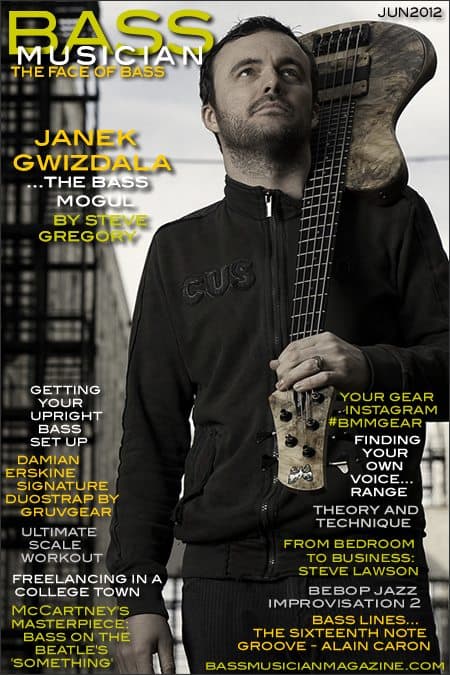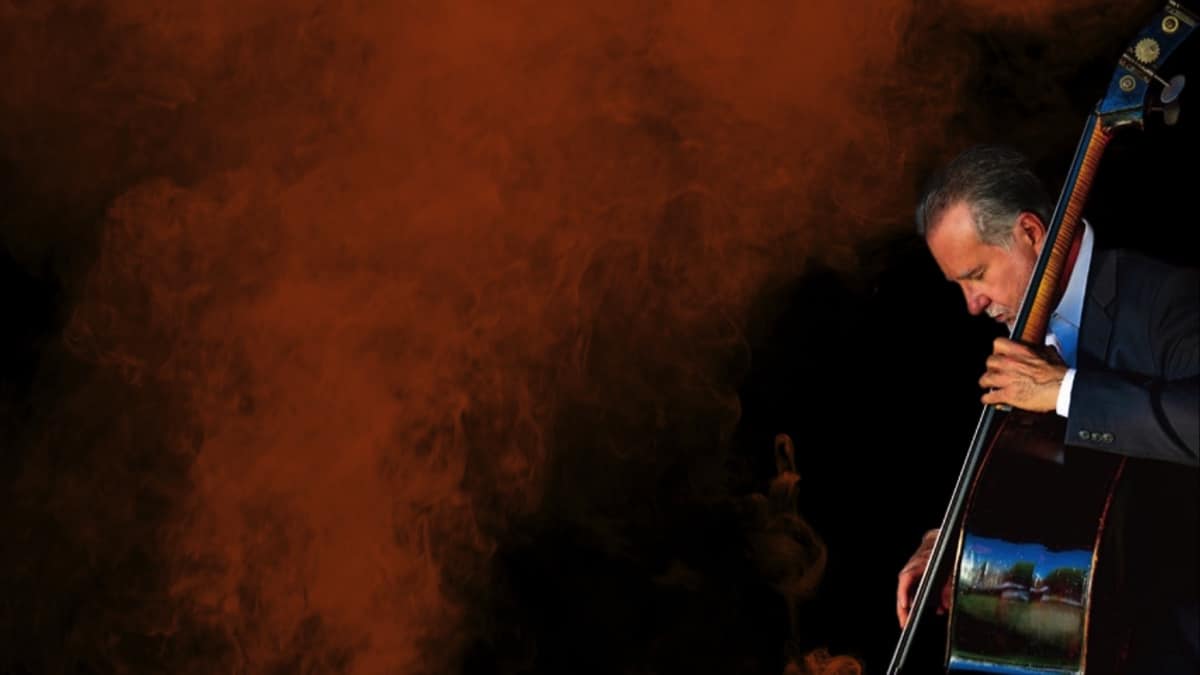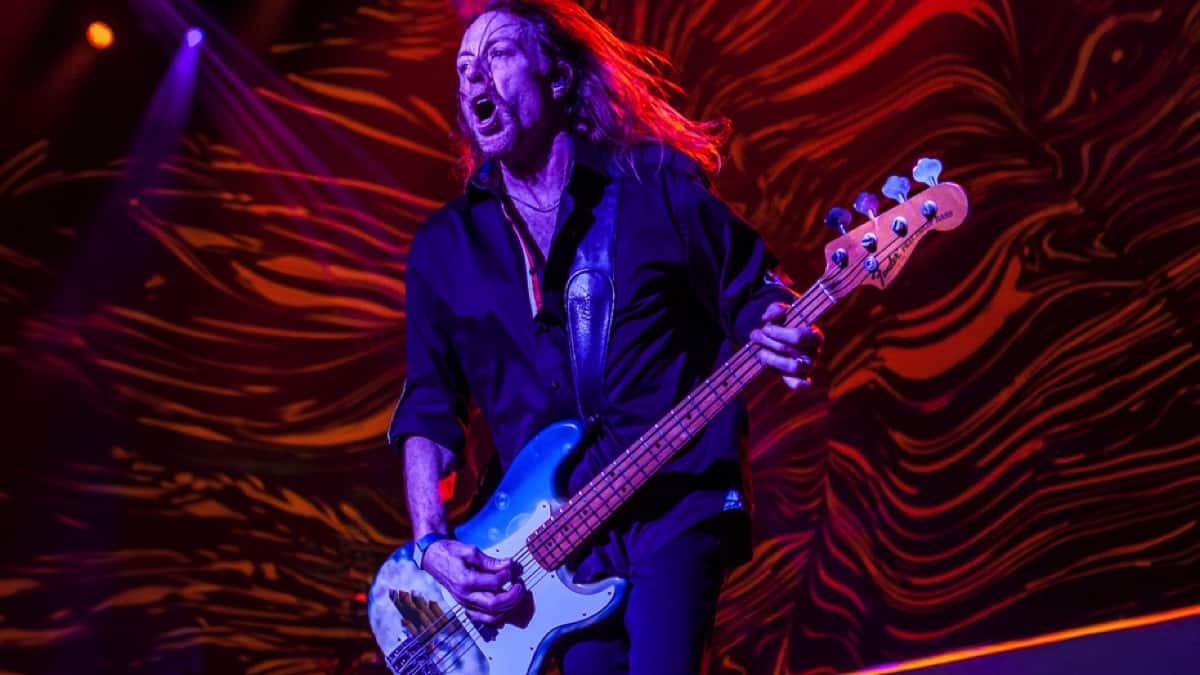Cover
Janek Gwizdala: The Bass Mogul by Steve Gregory – Bass Musician Magazine June 2012 Issue


Welcome to Bass Mogul Magazine?
Perhaps a name change is in order to appropriately accommodate the work of Janek Gwizdala. The number of different hats that Janek wears – bassist, producer, author, podcast host, educator, website creator, social media expert, businessman, to name a few – is only overshadowed by the ease with which they are changed. When this interview was conducted, Janek had just finished a string of live dates with Mike Stern. After arriving home at 4 am, he was up by 9 am to start a day of working on his forthcoming book before being ready for this interview at 10 am. Another short delay was, “all good”, since it allowed him to, “lay into some more work managing the schedule”. When asked how he could maintain such a pace, Janek humbly dismisses the claim that his work ethic is extraordinary, saying, “I don’t want to sound facetious or anything, but I don’t sleep too much.”
Sleep needs aside, it only takes a few minutes of speaking with Janek to understand that the real fuel for all of his endeavors is pure passion. When Janek plays, this energy is transformed into solid grooves, awe-inspiring technical displays, and fascinating loop compositions. As an educator, the true love of sharing knowledge is evident in every lesson. In business, Janek blazes a new path of self-production, taking on the established thought that following the models of yesteryear is the only way to become successful. No matter what the undertaking, Janek uses his passion as his goal: “I’m totally happy doing what I do and I think I strive for that on a daily basis.”
Janek grew up in London, where he was home-schooled in his early years. At the age of 18, he attended the Royal Academy of Music for one year, opting to then travel to the United States and attend Berklee College of Music. After a short stint at Berklee, Janek took his talents to New York City. This move led him to work with a number industry greats, including Mike Stern, Randy Brecker, Pat Metheny, John Mayer, Hiram Bullock, Delta Goodrem, Jojo Mayer, Airto Moreira, Flora Purim, Peter Erskine, Bob James, and Marcus Miller.
Janek also developed his own music, releasing his first solo album, “Mystery To Me” in 2004. His second album, “Live at the 55 Bar” was released in 2008.


Well, the embryonic stages of the concept for the album happened at a little gig at the 55 Bar in December of 2011. I’d been playing with Jojo [Mayer] for many, many years – 10, 12 years, maybe – and we have this great communication going on. I had more recently been playing with Mark Guiliana and I really wanted to hear what those guys would sound like together. I wasn’t actually aware that they had done that about a year before when we did this gig – Mark told me about it afterwards, I think. That was kind of the catalyst for it. We played a couple of my tunes on that gig, but that was essentially 85% jamming. That was the catalyst for the concept.

Once you got into the studio, how did that go down? Did you bring some melodic ideas and it really was jamming, then forming the tunes?
I personally didn’t bring a single melodic idea to the session. There was one groove that we had come up with on that gig back in December. Because I recorded that gig, I had a reference for it and that ended up being the track that’s called, “Straight Lines”. Other than that, everything else was made up on the spot apart from the two or three tracks that use backing tracks. We did have some synth loops, which my friend Dan Axtell pre-programmed. He pre-programmed about 5 or 6 things. I listened to them all and said, “Hey, I really like these two” and that’s what we used in terms of a starting point for a couple of songs that we could jam to.
How did you approach it from the bass standpoint? From the bandleader standpoint you’ve done the pre-production and you’ve picked the players. How did you go in and decide, “I’ll start my conversations this way”?

On the new record, it seems like effects are starting to a part of your bass voice, part of your bass vocabulary. What led you down that path? Is this a new exploration for you or something you were just led to do?
Actually, ironically, it’s not. It’s something I’ve been into for years and years. Obviously I’ve had varying, different amounts of finance available to purchase some of those toys! So that’s something that the more successful I’ve been, business-wise, the more I’ve been able to explore and expand my palette of colors like that. But I think it was more that I just didn’t know how – I didn’t have a voice, I didn’t know what I wanted to say with those things. I just didn’t know what was really available to the extent that I do now. It’s a learning process, I guess, over these years. I think it’s something that I didn’t feel comfortable putting on a record yet, because I didn’t have anything original to say. I could have slapped on an octave pedal and sounded like 50 other guys who use an octave pedal on their records. That wouldn’t have done anything for me and I don’t think that would have done anything for my audience either. I’m using it in what I hope is a somewhat original way, especially in the blending of the subharmonic aspect as well. It just took this amount of time I think.

Well, I think we live in a time of multimedia and I honestly think that the record – I was about to say the physical record and there’s barely even a physical record, but that aspect of the music – is sort of, for me, the bottom of the list of importance now in terms of the product and how it gets exposure. And I think that visually, the music or product or concept gets way more exposure than it does audibly and I think you can impact way more people if you do something visually. It’s a lot easier to understand than with something audible. That’s my opinion and my experience as well.
I think that a CD is a glorified business card. I’ve blogged about that, I’ve talked to people about that, and I talk about it in lectures, master classes, and clinics, and some people have taken it the wrong way. “Oh you’re just demeaning the process of making music – the making of music is sacred” and all of the rest of it. And I am absolutely not, you know. I’m just saying that in terms of the business structure of what the music industry has become, the CD or the audio product is not the pinnacle anymore. I think offering an experience and a much wider representation of what happened in those 2 days and what happened in the process of making this new album is going to give you much more mileage.
You have moved toward self-promotion, self-doing, self-creating: recording your own music on your terms and releasing it with a ‘pay what you want’ fee structure. Is there something you are moving away from, or something you are moving toward?

There are no record labels anymore. That sounds like a pretty broad statement but the reality is that there aren’t. You know, when you look at what a record label that exists right now is going to give you in terms of a deal, you should laugh and run in the opposite direction, because they’re offering you 18% and a budget which is probably a 50th of what it would have been 20 years ago to go and record your music. If you know anything about renting a studio and hiring musicians and getting a mix done and getting a master done and having those CDs pressed, you know that you can do the whole thing for under $10,000. So it’s a very, very simple process at the end of the day. And I guess that right there, I hit on it: it’s a simple process. It should be a lot simpler than people make it out that it is. Once people understand that, they’ll make 5 times as much art, they’ll have a much better following, they’ll be happier people, and their little world will thrive as a result.
You are very much a proponent of the idea that, “This isn’t a hard process – don’t buy the hype. We need more people doing this so that we can fill the world with art.” You will be releasing a book in June about self-promotion that has the working title, “Beyond Next Month’s Rent”. I’m guessing that the book talks about the hype myth and outlines your ideas on self-producing art?

I’m curious to see what the immediate reception has been to that idea? Has there been a lot of push back from the “old-school thought”?

I did and it’s a bit of what I was hinting at.
It was one phrase in that blog post that he wrote, that had he not written it, I would have just let it go and been like, “Okay, whatever. Nobody’s going to pay any attention to this”. But he wrote something like, “It’s so hard for the younger generation to make money from music these days”. That is what killed me, because I was like, “Hold on a second John, I am the younger generation!” Compared to John, a lot of us are still the younger generation because he’s 70 years old. He’s done everything. He had the glory years of playing with Miles and having major record deals and touring all over the world and all that kind of stuff. As soon as he wrote that, I thought, “Wow. A lot of people are going to read this and this is going to be impressionable to them.” That was kind of the catalyst for it all. That’s just hype right there, an old-school way of thinking. And yeah, there have been reactions like that, especially about giving music away. There was another blog post I wrote – there was some piano player in Los Angeles that did an open letter to LA club owners. I couldn’t disagree more with what he wrote. I wrote a pretty strong blog post about if you have something worth listening to, people will come and they will pay for it. You need somewhere to develop that.
So yeah, there’ve been a few little blowbacks, but what I’ve found so far in the responses I’ve had, the overwhelming responses have been, “I’m 20 years old – HELP! What do I do? What can I do to enhance my chances of being successful in doing what I love?” It’s all I needed to hear and I think that is overwhelmingly the majority of the responses so far. I kind of ignore the negative stuff and try to build upon the positive stuff as much as I can.
Another part of your empire, so to speak, is http://www.videobasslessons.tv. It seems like you were in that space where those responders are now. You were touring, you were gigging, and there was some good and some bad. There were also things like home life and touring schedules and other things that you wanted to control. How did [the website] start from being in that spot?
You hit the nail on the head. I mean, I’ve been on the road for the past 15 years pretty much every year – many, many, many shows – multiple hundreds of shows. It’s one of the big things I talk about in the book: you can’t buy experience. So as much as I talk to people about, “Hey, get out of this rat race and get into your own game”, there is also that element of experience that you cannot buy and you cannot manufacture for yourself in a short space of time. So I do talk about the balance of that, but the balance of the scales just tipped for me. I was on the road for 10 ½, 11 months back in 2010, pretty much straight the whole time. I played like 300 shows and dealt with things that were less than optimal for my sanity – one of them being coming home at the end of the year without any bread, having worked my ass off for almost a year. So that was something I needed to fix. I got back off the road that year of touring and I sat down with my wife and we both said, she said it first but I had already thought it, we’re not going to make it if I go out another 10 months on the road and we don’t see each other. So it was just that personal happiness and well-being comes for me a long way before any of the other stuff. You know http://www.videobasslessons.tv and magazine covers and great gigs and touring all over the world – that’s all secondary, being human is the primary and being happy is a part of me being human.

You mentioned Bob Reynolds. You recently worked on his latest record. How did approach that session? The album is coming out soon, correct?

So, the big thing that happened for me that week in the studio was I walked into the studio and I said to the engineer, “Hey I have a P-Bass with me and I have a Fodera and a few other things” and I said, “Do you have a shitty old bass in the studio just lying around? Like a beat up piece of crap that I can just throw some strings on to get a different sound that I like?” They came out with Jim O’Rourke’s, bass player for Sonic Youth, Fender Musicmaster that he had left in the studio about seven years previous to that. I put a set of nylon tape-wound flats on it and cut the whole record on the bass. It was insane – changed my life. I cut half of my new record on that bass as well.
Oh, really?
Oh yeah, yeah. So that was huge for me. You know, I’d been playing that music with Bob for so long that I didn’t really have to pay too much close attention to detail because we’d been paying so much attention to detail for so long with those songs that I was able to go in there knowing the music so well. That’s such a luxury, to go into a record and know the music that well. It was awesome! So I could just listen to Bob, I could listen to the producer, and I could listen to what was going on around me and really sit in the mix. You know, I just remember when I heard the masters being happy about how the bass didn’t overpower the record. It sat perfectly in the right place in the mix and it served the songs.
Another recent project is playing with Mike Stern – I know you just came off the road with him. When you play with Stern, what’s your approach there? He obviously has a long discography and there are several bass players that have played with him.

When I first played with Mike, just at his house years and years ago, I knew every single one of his songs and I knew exactly what he wanted from a bass player, just because I had listened to him so much and had checked out so many bootlegs of so many live shows. So I don’t think I have a conscious concept of what I do with Mike when I go into play with him, because it’s just something I’ve been doing for so long, even before I was actually playing with him.
I think that’s why I’ve been hired by Mike and by other people, because I really do check out the music in a big way. I learned half a dozen tunes off of Mike’s new record that we didn’t even play for this last trip we did to Chicago, but we jammed them on the sound check and Mike was like, “Whoa! I never played that because nobody ever learned the music, but we should do that on some upcoming tours!” It just little things like that where you give the music and the artist the respect that they deserve and the communication opens up a mile wider than what it was before. People really remember that kind of stuff. I don’t go in there with a subharmonic and an envelope filter and three distortion pedals – I know how to play super, super soft. I mean, I don’t think I’ve played this quiet in a long time than in the last 4 gigs with Mike.
In the trailer for the documentary about your recent album, you say, “We’re human before anything else. There’s all these other things we do before we’re a musician. I think that’s a big step for any musician’s life is being able to let go of what you do.” Is it fair to say that that is really your view of the artist?
Yeah, that was a life-changing moment for me, you know. If ever there was an “Ah-ha!” moment in my life, I guess that was it. I was like, “This stuff really isn’t as important as I think it is, you know. And it will become far more revered and popular and have more appeal when I let go of it and when I put less pressure on myself to produce it.”

I’ve just kind of figured that out now and studied it as well. All this stuff we do as musicians – we study records: “Oh yeah, you’ve got to listen to John Coltrane’s ‘A Love Supreme’, you have to listen to this Pat Metheny record, you’ve got to listen to Arvo Part symphonic suites, blah, blah, blah.” Well, there’s this guy named Tony Robbins…he’s got a lot of great things to say. It was people like that, for me, that was like, “Ah, okay, you don’t have to take yourself too seriously. There are other things going on in the world, you’re not the center of the universe.” Share, be honest, be open, and it’ll all come back to you. There’s no negative recourse for positivity, I’ve found. The less negativity I can put out, the less I’m going to get back, so it all grows in a positive direction.
So, your new record, Bob Reynolds’ record, http://www.videobasslessons.tv, the podcast …
I have 2 podcasts actually. I have the original one, which I haven’t done too much, but I’m planning on launching a few more over the next couple of months, which should be cool. And I do a podcast with my friend Justin Vasquez called “The Live Archive”. I don’t know if you’ve checked that out?
Yes – It’s so cool!
Well, it’s just our process to listening to music. We’ve hung out for years and just listened to music. Fast forwarded to the good bits, talked shit about it, and moved on to the next thing. So we’re like, why don’t we make a podcast out of this? So every few months we go down to Texas and record a ton of shows. So yeah, there’s a podcast, a blog, everything – it’s all there. http://www.janekgwizdala.com. You can find it all.
Thank you so much for this interview. Just listening to this dizzying array of stuff, I’m sitting here going, “Man, this guy is busy!” I truly appreciate it!
It was my pleasure. I’ve got all the time in the world to do stuff like this. This is what it’s all about, man. It’s about conversation and having open communication – about people getting the right information. There’s nothing worse than misinformation, because that leads people down the wrong path. It gives people the wrong idea. The more I can say, “Hey this is me, this is what’s going on, here it all is, come and join in”, the better.
Janek Gwizdala proudly endorses TC Electronic Amps, D’Addario Strings, and Fodera Basses. He invites readers to visit http://www.janekgwizdala.com to sign up for his mailing list and receive a free video lesson.
Bass Videos
Brian Bromberg, Paying Tribute to Scott LaFaro, April 2024

Brian Bromberg, Paying Tribute to Scott LaFaro, April 2024…

Brian Bromberg is one heavy-hitting bass player and I am in awe of his talent as one of the few individuals who is equally proficient on electric and upright bass.
You might remember our conversation back in 2018 when he released his powerhouse Funk album. Brian’s “A Little Driving Music” album is a staple on all our road trips and his Jaco and Jimi Hendrix tribute albums are mind-blowing… and I could go on and on.
Now, Brian has taken on the arduous task of producing an album paying tribute to the late, great, Scott LaFaro. He teamed up with pianist Tom Zink and drummer Charles Ruggiero and Brian delivers a commanding performance on upright. The entire album is a masterpiece and a real treat to listen to track after track.
Join us as Brian shares the details behind this project and more.
Photo, Michel Bocandé
Featured Videos
Visit Online
brianbromberg.net
FB @BrianBrombergBassist
YouTube
Cover
Leland Sklar, Over Half a Century of Bass, March 2024

We all have enjoyed Leland Sklar’s Bass lines for over half a century.

You might remember that we had him on our cover back in 2017 and did an update when he launched his book “Everybody Loves Me” in 2020. It was exciting to hear that The Immediate Family had got back together in the studio to work on their own music in 2019 and are now up to two albums.
Just last December, Magnolia Pictures released a documentary titled “Immediate Family” where we got a behind-the-scenes look at the massive contributions Danny Kortchmar, Waddy Wachtel, Ross Kunckle, Leland Sklar and Steve Postell have made in countless songs that are the very essence of our daily personal musical soundtracks. Seeing the astronomical roster of performers they have supported over many years is very eye-opening. It is a must-see for any music lover!
Now, I am thrilled to bring you a special chat with Leland Sklar where we go more in-depth into the bass side of his musical journey.
Photos: Header, Rob Shanahan – Cover Photo, Jay Gilbert/Chris Schmitt
Featured Videos:
Skin In the Game – https://www.youtube.com/watch?v=QhbnzIrdjJ8
from new album Skin In The Game
The Toughest Girl In Town – https://www.youtube.com/watch?v=UVQLZIRfLjU
from new album Skin In The Game
Fair Warning – https://www.youtube.com/watch?v=1DN18DYwLsU –
from the self-titled album The Immediate Family
Visit Online
www.immediatefamilyband.com/
www.facebook.com/TheImmedFamily
www.instagram.com/theimmedfamily/
Bass Videos
Ricky Phillips, STYX Bass And More – February 2024

Ricky Phillips, STYX Bass And More…

I have always been a huge Styx fan. Their music kept me awake during countless nights studying and gave my imagination a place to escape when I had a moment to take a break.
I had the immense opportunity to chat with STYX bassist Ricky Phillips for our August Cover in 2017 and follow his projects as time passed. Now, I am thrilled to have the opportunity to catch up with Ricky as he has been super-busy over the past six years.
Join me as we take a deep dive into the band’s most recent album “Crash the Crown” and EP “The Same Stardust”. Ricky shares some insights into the herculean team effort behind the scenes and the musical process that keeps them ever so busy and how he has updated his sound.
Without further ado… Here is Ricky Phillips!
Photo: Jason Powell
Featured Videos:
“Crash of the Crown” lyric video
“Reveries” lyric video
“Save Us From Ourselves” lyric video
“Sound the Alarm” lyric video
“Too Much Time On My Hands” Zoom video 2020
Visit online:
www.Styxworld.com
FB & IG @styxtheband
Bass Videos
Jeff Pilson, Foreigner Low End – January 2024

Jeff Pilson, Foreigner Low End – January 2024…

Those of us who were around back in the 70’s remember how certain songs on the radio resonated with us. It turns out that many of these iconic melodies came from Foreigner and they were part of our personal soundtracks!
After all these years, the band is going as strong as ever with Jeff Pilson firing away on bass midstream into a 2-year farewell tour.
I am excited to be able to bring you all the details about Jeff’s musical Journey, the farewell tour in progress, how he gets his sound and his plans for the future.
Cover Photo: Krishta Abruzziini / Video Photos: Krishta Abruzzini, Karsten Staiger, Gina Hyams
Featured Videos
For more news on FOREIGNER and upcoming Farewell Tour dates, fans can visit:
foreigneronline.com
facebook.com/Foreigner
twitter.com/ForeignerMusic
instagram.com/foreignerlive
youtube.com/user/FWebTeam
Also on FB @officialjeffpilson
Bass Videos
Rodney O’Quinn, Rockin’ Hard Through the Years – December 2023

Interview With Foghat Bassist Rodney O’Quinn…

Many rock fans have enjoyed music by Foghat, who originally formed in London back in 1971.
Over the many decades of playing, the band members have changed, leaving behind only Roger Earl as the only original member. Bassist Rodney O’Quinn left the Pat Travers Band and joined the group in 2015 and has been laying down the low end for this iconic quartet keeping the Foghat legacy alive. With a new album titled “Sonic Mojo” which dropped on November 10th, the band is as busy as ever and there is lots of very tasty music to come.
Join me as we learn of Rodney O’Quinn’s musical journey, how he gets his sound, and his plans for the future.
Photos:
Cover, Jake Coughlin
Video Thumbnail, Tom Apathy
Photos used in the video: Kerry Quinn, Chuck Lanza, Kim Granger, Kenneth Strohm, Jake Coughlin, Jay Jylika
Featured Videos:
1st Single from Sonic Mojo – Official “Drivin’ On”
2nd Single from Sonic Mojo – “She’s a Little Bit of Everything Official Video
“Road Fever”- California Mid State Fair – Paso Robles, CA – 7-27-22
“Stone Blue” – Rodney O’Quinn Bass/Lead Vocals – Don Odell’s Legends – Woonsocket, R.I – 10/15/22 – The Stadium Theater
The Earl’s Court – Season 2, Episode 7: Funny Guys
“I Just Want to Make Love to You” – CasinoRama – 6-9-23
FOGHAT “Somebody’s Been Sleepin’ in My Bed” – Mohegan Sun, Uncasville, CT – 1/28/22
“I Just Want to Make Love to You” – California Mid State Fair – Paso Robles, CA – 7-27-22
Visit Online:
www.foghat.com
www.facebook.com/Foghat
www.twitter.com/FOGHAT
www.instagram.com/foghat_official
www.youtube.com/user/FOGHATMUSIC

















